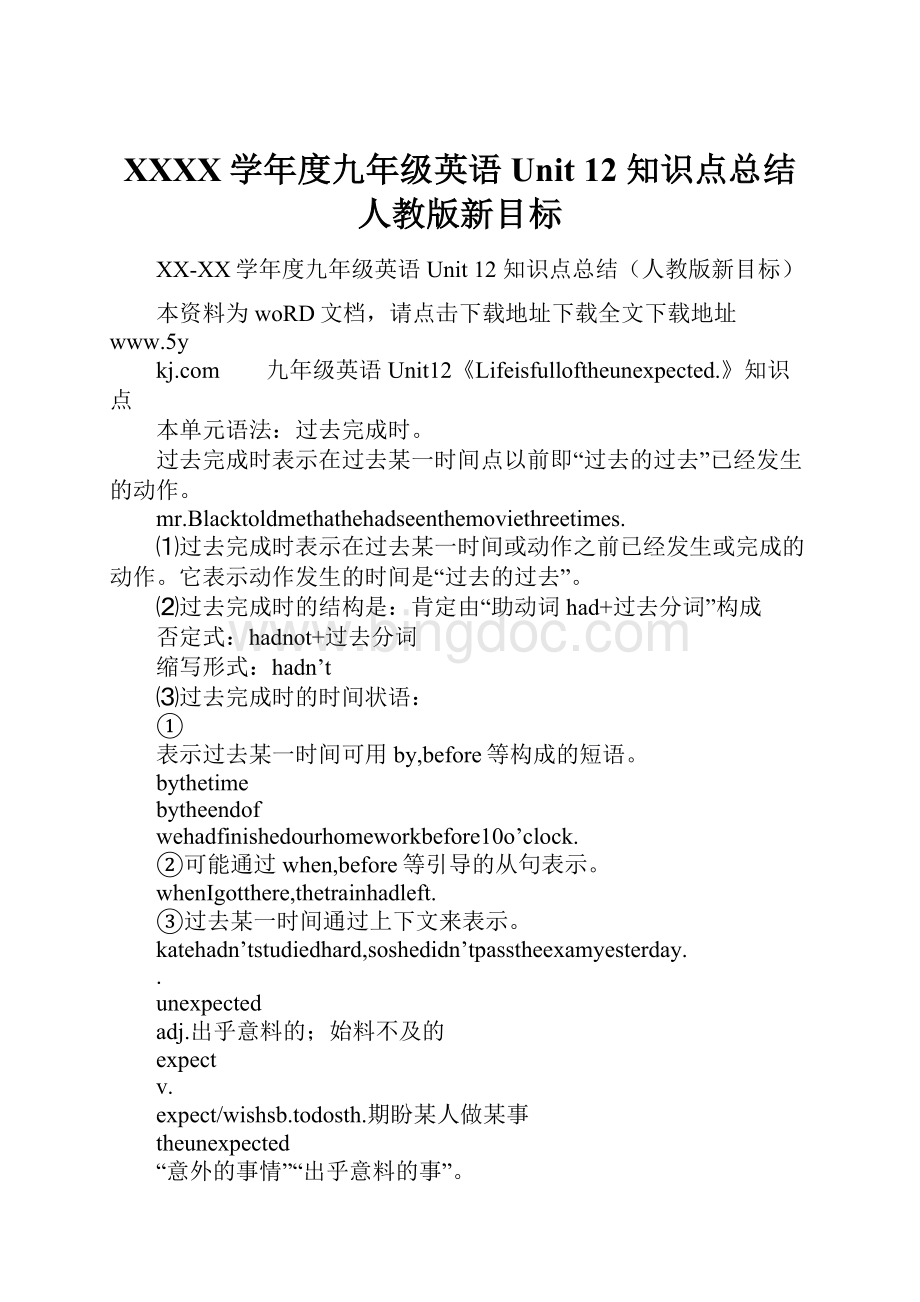XXXX学年度九年级英语Unit 12 知识点总结人教版新目标.docx
《XXXX学年度九年级英语Unit 12 知识点总结人教版新目标.docx》由会员分享,可在线阅读,更多相关《XXXX学年度九年级英语Unit 12 知识点总结人教版新目标.docx(16页珍藏版)》请在冰点文库上搜索。

XXXX学年度九年级英语Unit12知识点总结人教版新目标
XX-XX学年度九年级英语Unit12知识点总结(人教版新目标)
本资料为woRD文档,请点击下载地址下载全文下载地址www.5y
九年级英语Unit12《Lifeisfulloftheunexpected.》知识点
本单元语法:
过去完成时。
过去完成时表示在过去某一时间点以前即“过去的过去”已经发生的动作。
mr.Blacktoldmethathehadseenthemoviethreetimes.
⑴过去完成时表示在过去某一时间或动作之前已经发生或完成的动作。
它表示动作发生的时间是“过去的过去”。
⑵过去完成时的结构是:
肯定由“助动词had+过去分词”构成
否定式:
hadnot+过去分词
缩写形式:
hadn’t
⑶过去完成时的时间状语:
①
表示过去某一时间可用by,before等构成的短语。
bythetime
bytheendof
wehadfinishedourhomeworkbefore10o’clock.
②可能通过when,before等引导的从句表示。
whenIgotthere,thetrainhadleft.
③过去某一时间通过上下文来表示。
katehadn’tstudiedhard,soshedidn’tpasstheexamyesterday.
.
unexpected
adj.出乎意料的;始料不及的
expect
v.
expect/wishsb.todosth.期盼某人做某事
theunexpected
“意外的事情”“出乎意料的事”。
the+adj.表示一类人或事物。
thehomelessthedisabled
thewounded
theinjured
2.bythetime+时间状语从句
(1)时间状语从句的时态是一般现在时时(表示将来),主句用将来完成时;
(2)时间状语从句是一般过去式时,主句用过去完成时。
bytheendof+时间点
(1)+过去的时间点,主句用过去完成时;
(2)+将来的时间点,主句用将来完成时;
by+时间点
(1)+现在的时间点,主句用现在完成时;
(2)+过去的时间点,主句用过去完成时;
(3)+将来的时间点,主句用将来完成时。
Bythetimeyoucameback,Ihadfinishedthisbook.
Bythetimejanegetshome,herauntwillhaveleftforBeijing.
Bytheendoflastyear,IhadstayedinXinzhengforsevenyears.
Bynow,Ihavefinishedallmyhomework.
3.oversleep=sleeplatev睡过头
sleep→slept→slept
oversleep—overslept—overslept
–whathappened?
—I_____.
A.oversleep
B.oversleeped
c.overslept
4.givesb.alift=givesb.aride/givearidetosb.“捎某人一程”,
Thepooroldwomanwasstandinginthemiddleoftheroadandaskedsomeoneto___.
A.givehimarideB.giveheraridec.enjoyarideD.acceptaride
5.leave与forget的用法:
leave“遗留,落下,忘记带”,侧重指把某物或某人留在某个地方,后常跟地点状语;
forget“忘记”,侧重指忘记某件事情,后常跟todo或doing。
remembertodo
rememberdoing
♦leave→left→leftv离开
leavesth+地点把某物遗忘在某地
leavefor+地点
离开去某地
leaveamessage留言askforleave请假leaveschool毕业
leaveonebyoneself=leavesb.alone把某人单独留下
6.when的特殊用法“这时,突然”,用于四种结构
)bedoingsth...when
IwasthinkingofthiswhenIheardmynamecalled.
2)beonthepointofdoingsth...when
Shewasonthepointofgoingoutwhenthetelephonerang
3)beabouttodosth...when
wewereabouttostartwhenitbegantorain.
4).sb.hadhardly/scarcely/barelydonesth...when
wehadhardlyfallenasleepwhenthebellrang.
另:
beaboutto忙于;即将做某事。
侧重于表示动作马上就要发生,常与when引导的从句连用,但不与具体的时间状语连用。
7.befullof=befilledwith充满,装满
fill…with..
Thebasketisfullofapples.=Thebasketisfilledwithapples.
8.get/go/come/bebacktoschool=returntoschool意为“回到学校”
)getbackto后接表地点的名词,意为“回到某地”;
2)getbackto后面接人,可引申为“回复某人的信件,电子邮件,电话”等;
3)getback还可表示“回来,返回,拿回,取回”等含义。
4)giveback=return归还
9.myalarmclockdidn’tgooff!
gooff发出响声,
闹响Thealarmwentoffjustnow.
goover复习goaway离开
goby过去
goforawalk出去散步goon继续go+doing去做某事
gofishing/shopping/skating/swimming去钓鱼/去买东西/去溜冰/去游泳
0.rushout冲出去,冲出……waitinlinewith意为“与……排队等候”standinline站成一排cutinline插队
stareat凝视indisbelief不相信turn/changeinto变landon意为“着陆;降落于”belatefor迟到keepdoingsth一直做......wakeup醒来wake-woke-woken
1.evenif/eventhough/though/although都可以引导让步状语从句。
Evenif=eventhough“即使、纵然”引出的从句叙述的是假设或把握很大的事情
though“虽然”,引出的从句叙述的是事实。
IwilltryevenifImayfail.
Thoughitwasverylate,hewentonworking.
[注]though和but不能同时出现在句中。
2.above
)prep(表示位置)在…正上方;(与below相对)
Themoonisnowabovethetrees.
2)prep表示在地位、级别、能力、资历、重要性等方面“超过”
Heisabovemeineveryway.
3)adv.“在上面;在上文”。
Seetheexamplesgivenabove.
XXmetersabovethesealevel海拔XX米
3.alive,living,live与lively
lively
)live“活着的”,通常指物,不指人,常用来作定语放名词的前面。
还指“实况转播的”。
例如:
alivefish一条活鱼。
Doyoulikealiveshoworarecordedshow?
2)living意为“活着”强调说明“尚在人间”,“健在”,可用来指人或物,作定语或表语。
例如:
.myfirstteacherisstillliving.Englishisalivinglanguage.
Alivinglanguageshouldbelearnedthroughlisteningandspeaking.
Heisregardedasoneofthebestlivingwritersatpresent.
注意:
living前加上the,表示类别,指“活着的人们”。
例如:
Thelivingmustfinishtheworkofthosedead.
living还可用于短语,例如:
makealivingbydoing谋生。
3)alive意为“活着”,侧重说明生与死之间的界限,既可指人,也可指物;可用来作表语,后置定语或宾补。
例如:
Heisdead,buthisdogisstillalive.
Hewantedtokeepthefishalive.
Thisisafishalive.
4)lively则意为“活泼的”,“活跃”,“充满生气的”,可作定语、表语或宾补,既可指人,又可指物。
例如:
jennyisalivelygirl.Everythingislivelyhere.这儿一切都生机勃勃。
Hehadastrangewayofmakinghisclasseslivelyandinteresting.
live
物
定语
现场的
living
人/物
定语、表语
makealiving/theliving
alive
人/物
后置定语、表语、宾补
生与死的界限
lively
人/物
定语、表语、宾补
生气勃勃的,无活着的意思
1).jinyongisoneofthegreatestandoldest
writer.Heisstill
.
A.living;alive
B.living;living
c.alive;living
D.alive;lively
2).—Ishisgrandmotherstill
?
—yes,sheis102yearsold!
A.live
B.living
c.alive
D.Lively
4.takeoff在此句中意为“起飞”,off在此为副词表示“离开;走开”。
takeoff
也有“脱下”之意,此时off为介词,后可直接跟宾语。
Takeoffyourcoat.It'shotoutside.脱下你的外套,外面炎热。
5.TheotherplaneswerefullsoIhadtowaittillthenextday.
till意为“到,直到”,相当于until.
⑴用于肯定句时,主句的动词只用延续性的,它所表示的动作一直延续到till或until表示的时间为止,意为“直到……为止”。
ShewatchedTVtillhermothercameback
⑵用于否定句时,主句的动词一般是非延续性的,也可以是延续性的,它所表示的动作直到till或until所表示的时间才发生,意为“直到…(才)”。
Shedidn’twatchTVtillhermothercameback.
6.onAprilFool’sDay愚人节
makeafoolofsb.愚弄某人
7.embarrassv使尴尬→embarrassedadj.尴尬的→embarrassingadj.令人难堪的(修饰物)
8.invitesb.todosth邀请某人做某事invitesb.to+地点邀请某人去某地Thanksforyourinvitation=Thanksforasking/invitingme.
9.showup出席onshow=ondisplay展览
showoff炫耀showsb.around带某人参观showsb.sth=showsthtosb向某人展示某物
20.playtricksonsb.捉弄某人playjokesonsb.对某人开玩笑laughat嘲笑makefunof取笑
It'simpolitetolaughat,stareatorplay_____ondisabledpeople
A.fun
B.jokes
c.tricks
D.parts
21.manypeoplerantotheirlocalsupermarketstobuyasmuchspaghettiastheycould.
as+adj./adv.+assb.can/could=as+adj./adv.+aspossible.尽可能的
wemustdoeverythingaspossible.=wemustdoeverythingaswellaswecan.
22.sellout卖光(用物作主语时,常用于被动语态besoldout)
giveout分发=handout分发
workout解答出
(人)runoutof用完(物)runout用完goout出去
findout查明
lookout=becareful=takecare当心
takeout拿出putout熄灭
cutout删除
23.findout,lookfor与find
findout强调经过调查、询问、研究等曲折过程后才能找出。
如:
Pleasefindoutwhenthetrainleaves.
lookfor意为“寻找”,强调寻找的过程。
find意为“发现,找到”,强调寻找的结果。
24.endupdoingsth.(以…)结束;
Imustmakegooduseofmysparetime,orIwillendupdoingnothing.
endupas最终成为
Hestartedasanemployeeandendedupasheadofthefirm.
endupsth.表示“结束某事”
Thescientistendeduphisspeechatlast.
endupwithsth.(以……)结束
ThestudentsbeganwithspeakingEnglish,butendedupwithspeakingchinese.
attheendof在…末尾
intheend=atlast=finally最后
25.marryv嫁娶
AmarryB.“A与B结婚”Billmarriedmaryonjanuary1,1994.
AandBgetmarried=AandBaremarried
A和B结婚
getmarried结婚kateandTomgetmarriedlastyear.
marryAtoB“把A嫁给B”
Shemarriedherdaughtertoarichman.
be/getmarriedtosb与……结婚
26.当hundred/thousand/million/billion前面有具体的数字时,用单数形式
当hundred/thousand/million/billion后与of连用时用复数形式,
具体的不加s也不加of,不具体的加s也加of
27.Howdoyoufeelabout…?
=whatdoyouthinkof…?
=Howdoyoulike…?
“你怎样看待……?
”
用于提问对方对某事物的观点
28.hear短语
hear可用作及物动词,表示“听到”、“听见”,侧重于听的结果。
如:
I'mverysorrytohearthat.
hear后面还可以跟that从句,Ihearthatyou'vebeenhereforseveralyears.
hearof/about是指间接地“听到”“听说”后接名词性质的词。
如:
Ihaveneverheardofhimbefore.我以前从来没有听说过他。
hearof与hearabout的意义相近它们含有“听人说起”,“从书报上看到关于”等意义
I’veneverheardofhim.我从来没有听说过他。
Haveyouheardabouthimfromanywhere?
你从什么地方听到过他吗?
hearfromsb.=get/receivealetterfromsb.指“收到……的来信”其宾语应是人,而不是信。
如:
Ioftenhearfrommyparents.我经常收到父母的来信。
29.get/bedressed
穿衣服
wear穿,戴(强调状态)宾语可以是衣帽,也可以是饰物、奖章等。
you’dbetterwearblueorblackpantswithblownshoes.
puton
穿,戴(强调动作)后接衣服、鞋帽等。
Iwantyoutoputonthiscoatandthishat.
dress
给……穿衣服宾语通常是人,意思是“给……穿衣服”。
dressoneself或getdressed表示给自己穿衣服。
It’stimetowakeupandgetdressed!
in
后接表示衣服或颜色的词,着重于服装的款式或颜色。
它所构成的短语只能作表语或定语。
Hewasinanewblackcoat.
Thegirlinredismysister.
30.keep用法1.keep
+形容词
2.keep+sth/sb+形容词
3.keep+doing
一直做某事
4.keep/stop/preventsb....fromdoing...阻止做某事。
。
。
5.keepapet
饲养一个宠物
6.HowlongmayIkeepthisbook?
keep指借。
由非延续性动词到延续性动词的转换:
arrive→behere
begin→beon
die→bedead
comeback→beback
leave→beaway
fallill→beill
getup→beup
goout→beout
finish→beover
puton→wear或beon
open→beopen
join→bein或beamemberof…
close→beclosed
gotoschool→beastudent
borrow→keep
buy/get
→have
catch→have
gettoknow→know
begintostudy→study
cometowork→work
moveto→livein
finish/end→beover
cometo→bein
sitdown→beseated
marry→bemarried
dress→bedressed
Hehasbeenasoldierforthreeyears.
他参军三年了。
Hisfatherhasbeendeadfortwoyears.
他父亲去世二年了。
Thefilmhasbeenonfortenminutes.
电影已开始十分钟了。
wehavestudiedEnglishforthreeyears.我们(开始)学英语已三年了。
HowlongcanIkeepthisbook?
这本书我可以借多长时间?
31.getup起床
32.takeashower/getintheshower洗澡
33.be5minuteslatefor迟到5分钟
34.inthebackpack在书包/背包里
35.getbacktoschool回到学校
36.start/beginteaching=start/begintodo开始上课
37.brushone’steeth刷牙
38.washone’sface洗脸
39.atleast
43.whatisgoingon=whatishappening?
发生什么
44.feelluckytodosth做某事感到很幸运
45.jumpoutof跳出
46.gostraighttosp.直接到某地
47.getachancetosaygoodbye
得到一个机会说再见
48.acostumeparty一个化妆舞会
49.allnight整夜
50.takeplace发生
happen
51.sth.happenstosb.某人发生某事
sb.happentodosth.某人碰巧做某事
52.loseweight减肥
putonweight增肥
53.moveacross穿越
54.runaway逃离runawayfromsp.从某地逃离
escape逃跑
55.theluckiestday最幸运的一天
56.inthemiddleoftheroad在路中间
57.leadto通向;导致
58.cancelaplan取消一个计划
59.missdoingsth.错过做某事
60.abowlof...一碗......
61.leavemybackpackathome把背包忘在家里
62.missbothevents错过两个事件
63.raiseabovetheburningbuilding从正在燃烧的楼上升起
64.collectthemathhomework收数学作业
pletetheworkformyboss完成老板的工作
66.maketheapplepie制作苹果馅饼
67.addthegreenbeans加绿豆荚
68.fearspreadacrossthewholecountry恐惧席卷整个国家
69.theunluckiestdayofmylife一生中最不幸的一天
70.headwest向西行驶
71.turnaround调头
72.makeanunexpecteddiscovery作一个出乎意料的发现
73.itwastwoblockseastfrommyoffice它在离我办公室东面两个街区的地方
74.takeaholiday=haveaholiday度假
75.whatbadluck
76.thedaybefore前一天
77.callsb=telephone/phone/ringsb
78.therewouldbe+n